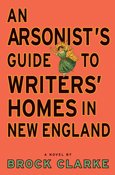In "Arsonists' Guide to Writers' Homes in New England" (Algonquin, re-release 2008, $23.95), Brock Clarke delivers a hybrid memoir/mystery with a bumbling everyman narrator, a cast of preposterous characters, and a plot that winds its way around the question: "What is the power of a story?"
As a teen, Sam Pulsifer inadvertently burns down the historic Emily Dickenson home and kills two off-duty docents. But all that was long ago. The book begins after Sam's 10 years in prison, when he is settled as a packaging scientist with a wife and two cute kids in sunny Camelot, Mass. Then, one day, Thomas Coleman appears at the Pulsifers' door and unleashes decades of pent-up pain and vengeance at the man who killed his parents. In the meanwhile, a string of attempted torchings of New England authors' homes brings Sam back into the public eye, and he sets out to clear his name, sort out the pieces of his sordid past, and answer the nagging question: "If a good story leads you to do bad things, can it be a good story after all?"
In his quest, Sam meets a slew of could-be literary arsons, each more hilariousand less suspectthan the last. There is the lonely professorial old man, the plunger-toting hick and the drunken over-the-hill publisher, to name a few. Each wrote Sam a letter years before begging him to burn down their local celebrity author's house, because all are afraid of being overshadowed by a famous author or character.
Clarke's deadpan style comes through especially well in his evocation of these characters. To describe the professorial Mr. Frazier, Clarke takes his readers on a long stride in Mr. Frazier's shoes to understand how the old man must view swearing: "There were enough words in the world already, and too many of them were curse words, and too many young people cursed in such a way that you could not discern the object of the swearing and in such a way that made you think that this was simply the way they talked."
Despite these wonderful nuggets of characterization, however, the plot runs thin as Sam repeatedly blunders onto crime scene after crime scene.
Part of the problem is that Clarke's sharp literary voice is at odds with his protagonist's bumbling, seemingly mindless actions. As he follows the trail of would-be arsons, Sam always manages to be at the wrong place at the wrong time, thereby incriminating himself. The unfortunate effect is that Sam's character loses credibility, which makes the plot drag.
To his credit, Clarke creates in Sam a sympathetic protagonist with a range of real emotions in the midst of this outrageous world. We truly feel sorry for Sam at several pointswhen his wife refuses to even see him when he reveals dark truths about his parentsand these tender moments draw us back in.
Clarke never judges the ultimate power of stories for good or evil. Rather, he humorously shows stories to be powerful, convenient and profitable tools. Countless characters, including Sam, refuse to enjoy stories as simple fiction, but rather insist on living out their fantasies to help them comfort, protect, retaliate, or win fame and fortune. Without their stories, we learn, characters' entire worlds come crashing down around them, as Sam's does when Coleman exposes him to his wife and family.
Sam's final act of writing his story into a memoir, an "Arsonist's Guide," is Brock's final word on our value of stories: Characters would rather live out their stories in the name of creating a memoir, just as humans prefer to hear and read "true" stories rather than fictional fantasies. Even as he writes it from his jail cell, Sam can only imagine that someday "we'll be like normal people, people who, after a long day's work, want to do nothing else but have a drink and read a book." Until then, we will continue to strive to live out our stories and be dissatisfied with mere fantasies.
Despite a struggling plot, "The Arsonist's Guide" shows Brock Clarke's potential to catapult himself into the ranks of great contemporary American humorists who defy the conventions of genre. The work is both a whodunit mystery, as Sam investigates the string of arson attempts in New England, and a memoir of Sam's adventure into literary arson. Clarke has a field day using and satirizing the conventions of both, creating over-the-top villains and articulated lessons learned. I recommend this book to anyone willing to laugh at himself, who is a storyteller, and who will take comfort in seeing how very close we live to the brink of absurdity.



Comments
Use the comment form below to begin a discussion about this content.
comments powered by Disqus